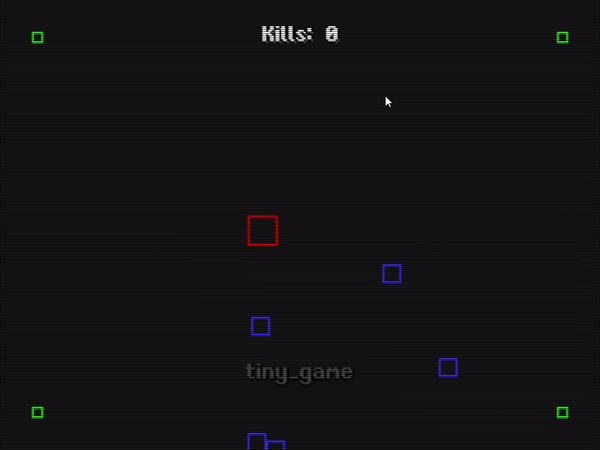Tiny is a small embeddable compiler and bytecode interpreter; it is designed to be easy to embed and does its best to avoid doing allocations/garbage collection.
// Reverse polish notation calculator
stack := array()
op = ""
while op != "quit" {
op = input()
if strchar(op, 0) == '+' {
array_push(stack, array_pop(stack) + array_pop(stack))
} else if strchar(op, 0) == '-' {
array_push(stack, array_pop(stack) - array_pop(stack))
} else if strchar(op, 0) == '*' {
array_push(stack, array_pop(stack) * array_pop(stack))
} else if strchar(op, 0) == '/' {
array_push(stack, array_pop(stack) / array_pop(stack))
} else if op == "=" {
print(array_pop(stack))
} else if op != "quit" {
array_push(stack, ston(op))
}
}
You can use CMake to build a static library which you can integrate into your project
like any other. Alternatively, you can just copy include/tiny.h, include/tiny_detail.h and src/tiny.c (also src/tinystd.c if you want the standard library) into your project.
The entire API available to the host application is supplied in include/tiny.h.
Here is few examples of how you could use Tiny in your program.
I've written a small game which is scripted using Tiny. This example makes no use of garbage collection; in fact, there is no dynamic allocation being done in the scripts at all.
You can find the code in the examples/game subdirectory of the repository. I made use of https://bitbucket.org/rmitton/tigr to facilitate the windowing, graphics and input.
Notice how every entity in the game has a Tiny_StateThread encapsulating its execution state. Since Tiny_StateThread is relatively lightweight, you can have hundreds, even thousands of them.
Let's say I've written a text editor in C and I want users to be able to write plugins for it, but I don't want them to have to write/compile C code in order to do it. This is a good use case for something like a scripting language.
// The plugin subsystem for an imaginary text editor
#include "tiny.h"
#define MAX_PLUGINS 32
typedef struct
{
// ...
int numPlugins;
Tiny_State* plugins[MAX_PLUGINS];
} Editor;
static Tiny_Value ReplaceAll(Tiny_StateThread* thread, const Tiny_Value* args, int count)
{
// We store the Editor* in the thread's userdata field
Editor* ed = thread->userdata;
// Make sure that 2 arguments are supplied
if(count != 2) {
PluginError(ed, "Invalid number of arguments supplied to replace_all.");
return Tiny_Null;
}
const char* from = Tiny_ToString(args[1]);
const char* to = Tiny_ToString(args[2]);
// Make sure these are valid strings
if(!from || !to) {
PluginError(ed, "Invalid strings supplied to replace_all.");
return Tiny_Null;
}
int numReplaced = EditorReplaceAll(ed, from, to);
return Tiny_NewNumber((double)numReplaced);
}
void LoadPlugin(Editor* editor, const char* filename)
{
assert(editor->numPlugins < MAX_PLUGINS);
Tiny_State* state = Tiny_CreateState();
Tiny_BindFunction(state, "replace_all", ReplaceAll);
// If this were an actual editor I'd supply more functions
Tiny_CompileFile(state, filename);
editor->plugins[editor->numPlugins++] = state;
}
void DestroyPlugins(Editor* editor)
{
for(int i = 0; i < editor->numPlugins; ++i) {
Tiny_DeleteState(editor->plugins[i]);
}
}
// We can call this if we want to run the entire script all at once
void RunPlugin(Editor* editor, int pluginIndex)
{
assert(pluginIndex >= 0 && pluginIndex < editor->numPlugins);
// Let's spin up a single "thread" to run this plugin
Tiny_StateThread thread;
Tiny_InitThread(&thread, editor->plugins[pluginIndex]);
thread.userdata = editor;
Tiny_StartThread(&thread);
// Just keep running until the VM halts (i.e. script is done)
while(Tiny_ExecuteCycle(&thread));
Tiny_DestroyThread(&thread);
}
// We can call this if we want to spin up a thread and execute cycles
// whenever we can (i.e. run the plugin asynchronously).
Tiny_StateThread* StartPlugin(Editor* editor, int pluginIndex)
{
assert(pluginIndex >= 0 && pluginIndex < editor->numPlugins);
// Just like for RunPlugin
Tiny_StateThread* thread = malloc(sizeof(Tiny_StateThread));
thread->userdata = editor;
Tiny_InitThread(thread, editor->plugins[pluginIndex]);
// We start the thread, but we don't execute any cycles
// the user is responsible for doing that.
Tiny_StartThread(thread);
return thread;
}And that's an example of how one might integrate Tiny into their application.
